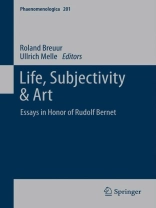This book contains essays written by eminent phenomenologists & scholars closely related to R. Bernet, a person and a philosopher (colleagues, friends and collaborators, former students). The intellectual and worldwide authority of R. Bernet’s work is well represented by the list of contributors, as well as by the content of their chapters. In a sense, this volume is a good indication of the importance of Bernet’s own books, articles and classes.
The editors have chosen to concentrate the contributions on what could be estimated to be one of the three major themes of his philosophical itinerary: life, seen from a phenomenological point of view, its relation to subjectivity, experiences and consciousness, and both seen as the ground for an original reflection on art (paintings).
สารบัญ
Preface, R. Breeur.- Vorwort, U Melle.- Acknowledgements.- How Aristotle and Husserl Differ on First Philosophy, R. Sokolowski.- Gemaltes Erscheinen – von Giotto zu Cézanne, K. Held.- Husserls deskriptive Erforschung der Gefühlserlebnisse, U. Melle.- Verstehendes Leben, E. Angehrn.- Sichtbar verständliche Dinge, G. Figal.- Le domaine de la vérité, D. Franck.- Freiheit und Endlichkeit.
Cassirer, Heidegger und Kant, G. Van Eekert.- Empathy and mirroring: Husserl and Gallese, D. Zahavi.- Soziale und individuelle Aspekte produktiven und kreativen Handelns, K. Mertens.- Ego and Arch-Ego in Husserlian Phenomenology, D. Lohmar.- Silhouette & Manipulation, F. Mattens.- Le problème de la réalité, J. Benoist.- Statut et origine de la négation, D. Pradelle.- Transcendance et inconditionnement, R. Legros.- The Institutional Life, D. Meacham. -The Role of Interpretation in the Phenomenological Approach to the Other, L. Tengelyi.- The Letter and the Soil. Why Humanity is not a Forest, R. Visker.- The Third Life of Subjectivity: Towards a Phenomenology of Dreaming, N. de Warren.- Moral life in times of loneliness. Does the notion of double conscience illuminate Lacan’s understanding of moral sensibility? P. Moyaert.- Phénoménologies du randonneur solitaire, R. Breeur.












